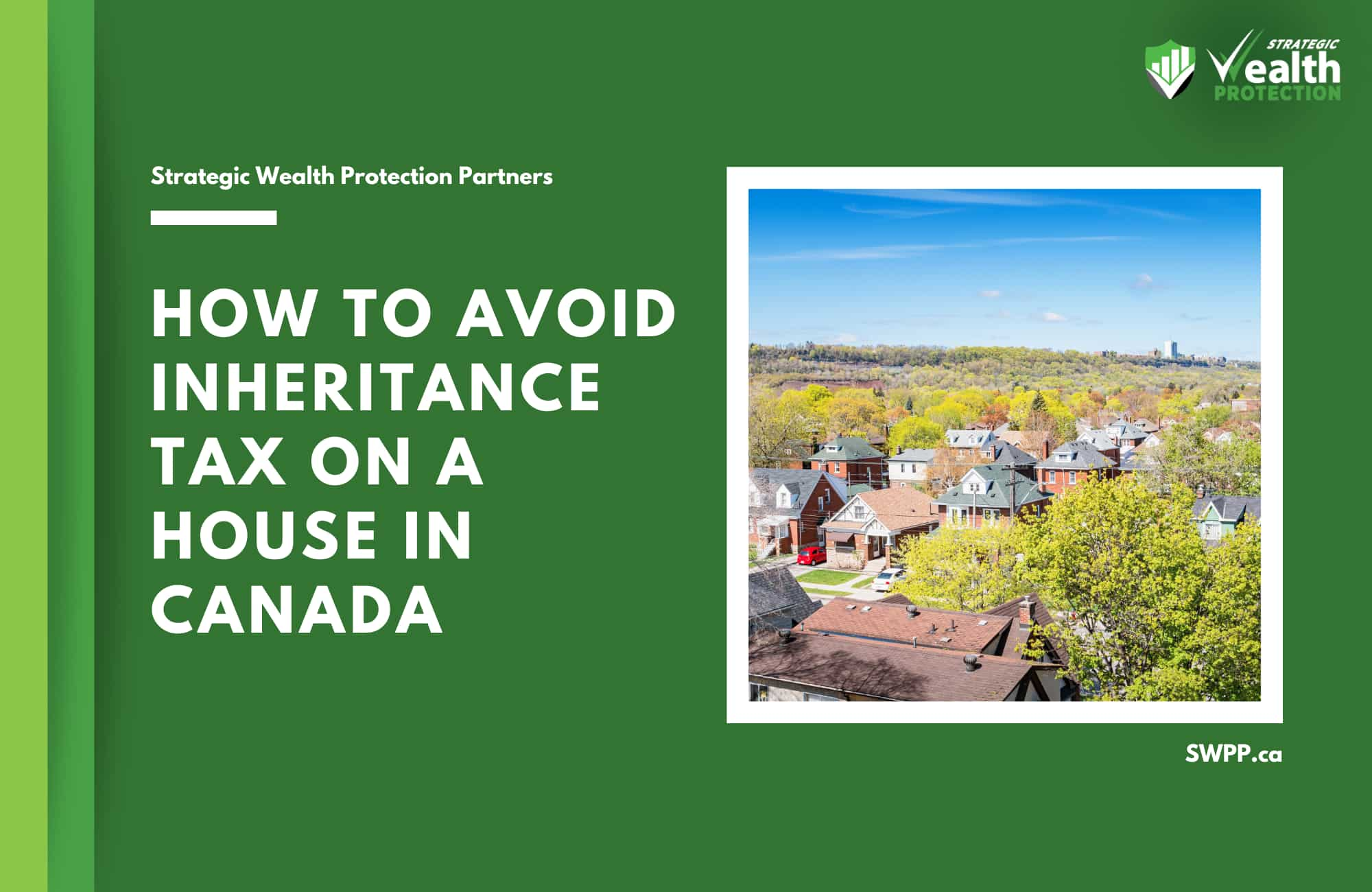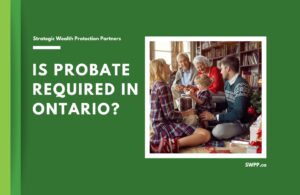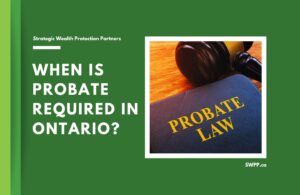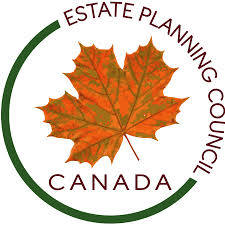Written by Ron Cooke, President & Founder of Strategic Wealth Protection Partners in Ontario, CEA®, Member of the Estate Planning Council Canada
How to Avoid Inheritance Tax on a House in Canada
In Canada, there is no direct inheritance tax, but inheriting a house can come with tax implications.
Understanding how these taxes work and planning ahead can help reduce costs and maximize the value of your inheritance.

Is there an inheritance tax on a house in Canada?
No, Canada does not have a direct inheritance tax.
When someone passes away, their estate is responsible for any taxes before assets, including real estate, are transferred to beneficiaries. However, capital gains tax may apply if the property has increased in value, and probate fees may be required depending on how the property is structured.
With proper planning, many of these costs can be minimized or avoided.
How can I reduce the tax on an inherited house in Canada?
To reduce tax on an inherited house, consider strategies like:
- Transferring the property to a spouse, as assets left to a spouse or common-law partner are exempt from immediate taxation.
- Using the principal residence exemption, which eliminates capital gains tax if the property was the deceased’s main home.
- Gifting the property before death, though this may trigger capital gains tax at the time of transfer.
- Holding the property in a trust, which can help manage tax liabilities and probate fees.

What happens when you inherit a house in Ontario?
When inheriting a house in Ontario, the estate may be responsible for capital gains tax on any increase in property value from the original purchase date to the date of death.
If the house was the deceased’s principal residence, no capital gains tax applies. However, if it was a secondary property, tax is owed on 50% of the gain. If probate is required, the estate may also need to pay probate fees, which are calculated based on the home’s value.
How much tax do you pay when you sell an inherited house in Canada?
If the house was the deceased’s principal residence, you won’t pay capital gains tax upon selling.
However, if it was a secondary property (such as a cottage or rental), you’ll pay capital gains tax on 50% of the increase in value from the time of inheritance to the sale date. The exact amount depends on your personal income tax bracket. Proper estate planning can help defer or minimize these taxes.
How to Deal with Capital Gains Tax on Inherited Property in Ontario
Primary Residence
If the inherited house was the deceased’s primary residence, it is exempt from capital gains tax.
To maintain this exemption, the beneficiary must either sell the house soon after inheriting it or continue using it as their primary residence. If the house is converted into a rental property or secondary home, capital gains tax may apply in the future.
Additional Properties
If the inherited property was a vacation home, rental property, or investment real estate, capital gains tax applies based on the increase in value from when the deceased purchased it to their date of death.
The tax is owed by the estate before transferring ownership. Beneficiaries can reduce tax liabilities by selling the property strategically, applying capital loss offsets, or spreading the gain over multiple tax years to lower the taxable amount.
How can life insurance help build wealth and support inheritance goals?
I always say: life insurance is a financial tool. Whether or not it’s the right one depends on your goals.
There are two key advantages to life insurance:
- Tax-sheltered growth – If you don’t need the capital during retirement, the money inside the policy grows tax-free.
- Tax-free payout at death – That’s when you need the cash the most, and the policy provides it without triggering more tax.
If you own a corporation, it gets even more interesting.
The death benefit can be paid into the corporation tax-free and then pulled out via the capital dividend account. That gives you a way to extract money from the corporation without triggering personal income tax.
You can even overfund the policy and borrow against it—getting back the money you put in without selling the policy. It’s one of the few tools that lets you grow wealth, reduce taxes, and support your estate goals all at the same time.
Avoid Ontario’s Hefty “Death Tax”
While Ontario doesn’t have a direct estate tax on your total net worth, income tax on capital gains and deemed dispositions can have a significant impact on your estate.
These taxes can dramatically reduce the wealth you pass on to your loved ones.
For instance, assets like real estate (excluding your principal residence) and non-registered investments are deemed sold at fair market value upon death. The resulting capital gains are usually taxed at Ontario’s highest marginal tax rate, which exceeds 53.53% (2024).
Here’s an example: If you have an RRSP or RRIF worth $1,000,000, the government could take $535,000 in taxes upon your death. That’s more than half of your hard-earned savings—gone to taxes, not your family. And that’s before factoring in additional costs like probate fees, executor fees, legal fees, and accounting fees. What will be left for your family?
Did you know that some of your assets may even face double taxation? Without proper planning, the total financial burden on your estate could be staggering.
Simple Steps Can Save You Millions
With our Living Estate Plan, you can not only minimize taxes but also protect and even grow your wealth.
Our proven strategies help shield your assets, ensuring more of your legacy goes to your loved ones—not the government.
Discover How to Minimize Taxes and Secure Your Legacy
Did you know that without a solid estate plan, taxes and fees in Ontario could claim a significant portion of your wealth?
If you’ve worked hard to build your business, investments, and properties, protecting your legacy for your loved ones is critical. At Strategic Wealth Protection Partners, we specialize in helping high-net-worth individuals in Ontario secure their financial futures.
Our Living Estate Plan is designed to:
- Reduce estate taxes and probate fees.
- Simplify wealth transfer to your loved ones.
- Reflect your values and priorities in every detail.
Your Legacy Matters
With our personalized guidance, we’ll help you navigate options like Living Trusts to protect your assets and ensure your family’s peace of mind. Contact us today to book your Living Estate Plan Consultation and take the first step toward a secure future.
Schedule a Living Estate Plan Consultation
Planning your legacy is about more than numbers—it’s about ensuring your family remembers you and your values are honoured for many years to come.
Estate planning and trusts can feel overwhelming, especially if it’s your first time. That’s why we’re here.
With our simple, 5-Step Living Estate Plan, we make the process easy, helping you create a comprehensive estate plan or trust that protects your assets from taxes and probate fees while preserving your legacy. Tools like The Final Word Journal capture your story, wishes, and essential details like accounts and end-of-life plans, ensuring your family has clarity and comfort.
Take the first step today—schedule a consultation call and give your family the ultimate gift: peace of mind and the assurance they were always your priority.
Read More
If you’re starting your estate planning process, you may find these articles helpful:
- Living Trust Ontario Guide: How It Works & Do You Need One?
- How Much Can You Inherit Without Paying Taxes In Canada?
- How to Avoid Estate Tax in Ontario
- When You Inherit a House in Ontario, Is It Taxable?
- How Does a Living Trust Work in Ontario?
About the Author
RON COOKE, PRESIDENT & FOUNDER OF STRATEGIC WEALTH PROTECTION PARTNERS

With over 30 years in financial services, I’ve seen the challenges families face when a loved one passes—lost assets, unnecessary taxes, and emotional stress. That’s why I created the Living Estate Plan, a comprehensive process to protect assets, eliminate estate and probate fees, and create legacies that are remembered for many years to come.
This plan ensures your family receives not just your wealth, but a meaningful reminder of your care and love. Tools like The Final Word Journal capture your story, wishes, and essential details, offering clarity and comfort during difficult times.
Your final gift should be more than money—it should be peace of mind, cherished memories, and an organized estate.
Schedule a Call
Schedule a 30-minute consultation call with Strategic Wealth Protection Partners.
Click HERE to schedule a consultation.









